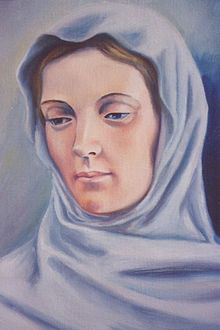Jeanne Le Ber
| Servant of God Jeanne Le Ber |
|
|---|---|
 |
|
| Born |
Jeanne Le Ber January 4, 1662 Montreal |
| Died | October 3, 1714 (aged 52) Montreal |
| Cause of death | illness |
| Resting place |
Montreal 45°30′32″N 73°33′15″W / 45.50889°N 73.55417°W |
| Residence | Montreal |
| Citizenship | New France |
| Education | Ursulines of Quebec |
| Known for | Her reclusion |
| Home town | Montreal |
| Spouse(s) | Never Married - Celibate |
| Parent(s) | Jeanne Le Moyne, Jacques Le Ber |
Jeanne Le Ber (4 January 1662 – 3 October 1714) was a religious recluse in New France.
Jeanne Le Ber was born in Ville-Marie (Montreal), on January 4, 1662. As a daughter of Jeanne Le Moyne and Jacques le Ber, Jeanne was raised within a wealthy and influential family; her mother was a sister of Charles le Moyne. Jeanne Le Ber was baptized the day she was born by Gabriel Souart, Paul Chomedey de Maisonneuve being her godfather and Jeanne Mance her godmother.
She took an early interest in the spiritual life of the community and was a frequent visitor with her godmother, Jeanne Mance at the Hôtel-Dieu. She also had a friendship with Marguerite Bourgeoys, the foundress of the Congregation of Notre Dame, who influenced her spiritual life. To complete her formal education she spent three years, 1674 to 1677, as a boarder with the Ursulines of Quebec where her aunt, Marie Le Ber de l’Annonciation, taught. At the age of 15, she returned to her family in Montreal.
As the only daughter (she had three younger brothers) of Jacques le Ber, with a dowry of approximately 50,000 écus, she was rightly considered the most eligible girl in New France.
When she was eighteen, she obtained from her parents' permission to live as a recluse in her family home. Completely withdrawn from the world, she left her home only to go to Mass. When the sisters of the Congregation of Notre Dame decided to build a church on their property, Jeanne had a three-room apartment behind the altar built to her specifications, in return for a generous gift. Her amended vows, which covered perpetual seclusion, chastity, and poverty, had not caused her to divest herself of properties given to her by her family.
...
Wikipedia
